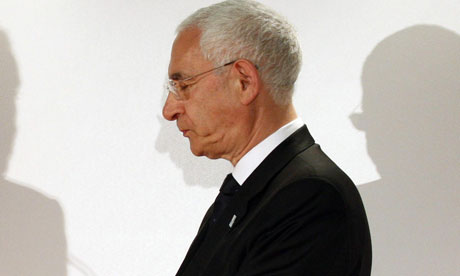
The politics of English football can be scripted as a civil war between the Football Association and the state within a state known as the Premier League. With no chairman, no chief executive and a joke Wembley pitch the FA are losing this historic struggle between a suffocating committee culture and the rampant consumerism of the game's alternative parliament.
In the deeper sense Lord Triesman fell long before he sat down for dinner with a woman who had seen too many FBI stings in The Sopranos. His demise started the day he said the unsayable. The Premier League, he pointed out, was a wild west of debt and unsustainable player wages.
We now know that Ian Watmore, the downed chief executive, said much the same, and more, in a paper that went down like "a bucket of sick" with the Premier League, according to a source in David Conn's Guardian report.
Watmore, another Whitehall defector, also pointed his torch at the fit and proper persons test, which Pol Pot would have sailed through, and deliberately complex ownership structures that discourage scrutiny.
You may think this is shaping up as a defence of the FA in the face of Premier League avarice. No. Sympathy has evaporated for an organisation that refuses to reform itself as recommended by its own Burns report, torches £756m on Wembley and lays a pitch that steeplechasers would recoil from, and takes nearly 10 years to start work on its own plans for a National Football Centre. If the FA are not careful they will end up like the Jockey Club: overseers for the laws of the game and dispensers of gin and tonic. But most of us still feel the game needs a strong FA to protect it from the ram-raids of speculators, owners who are no more tangible than poltergeists and industrialised cheating on the field of play.
Watmore went in different circumstances to Triesman, whose demise reminds us that people in public life would be wise to check under the risotto for bugs if they are tempted to make serious allegations with no supporting evidence to companions they assumed to be friends. In March, Watmore stomped out saying he was "neither chief nor executive" after bouncing off the wall of Premier League power and FA paralysis. A stratum of slick young deal-makers compete with Premier League heavies and empire builders from the shires to define what the FA are meant to be for: England, TV deals, the grassroots, the FA Cup, governance, moral leadership or winning a World Cup bid?
While they dither, the Premier League have consumed the host, growing so mighty that Triesman was widely portrayed as a dead man walking from the moment he alienated the top 20 clubs with his solo attack on borrowing, which was like bringing a knife to a gunfight. A fatal mistake was to add the chairmanship of the 2018 World Cup bid to his role at the FA. Fifa's electors knew right away that disunity had been mainlined into England's candidacy, which was confirmed when Dave Richards, the Premier League chairman, resigned his 2018 role, claiming, hilariously, that he could be of more use supporting the bid from "outside".
So Triesman's reformist dreams were doomed long before the Mail on Sunday finished him off by telling the world of his odd conspiracy theory about Spain and Russia colluding to bribe referees. In football, as in all things, it pays to work out where the real power rests, and it was not with a governing body that has been left crippled with Wembley's construction costs, have failed to preserve the FA Cup's romantic lustre and keep having to dish out £5m a year plus to foreign coaches to manage the national team. In an imagined landscape of crowds flooding up Wembley Way to see a Cup or England game played on perfect grass, the FA represent the many and the Premier League speak for the few. But even Barry Hearn, the Leyton Orient chairman who is assailed by a corruption scandal in snooker, his other sport, is now delivering impassioned speeches about "governance", which I do not remember him doing when he was Chris Eubank's promoter. The problem is the Premier League will not govern, because regulation is alien to their spirit, and the FA cannot, because they are stuck in a vanished age and lack the unity and purpose to face down the big clubs.
To Fifa's electors Triesman's remarks will have confirmed the English tendency towards condescension and arrogance and its addiction to tribalism. No one could sensibly dismiss England's stadiums or the ardour it would bring to a tournament staged on these shores, but many of the people charged with bringing the World Cup have committed a crime against the "passion" they ask David Beckham to laud in his speeches to Fifa audiences.
There are many things the English/British ought to be a good deal angrier about than they apparently are, and this is one. Any chance of a Great Reform Act for the national game or should we just leave it as a free-for-all?

